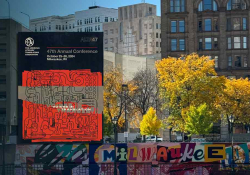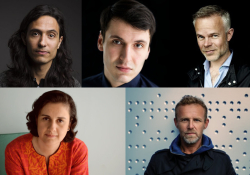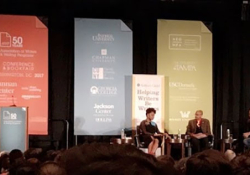Falling into a Laurence Cossé Novel in Looking Glass Books, Edinburgh
He decided to make a selection that would be as arbitrary as it was brilliant. . . . Very quickly the idea of selling books that he himself would not advise people to read infuriated him. . . . All that remained in his little shop were those books which enchanted him.
— A Novel Bookstore, Laurence Cossé, translated from the French by Alison Anderson
Edinburgh is a city of independent bookstores. Within a short walking distance, Avizandum sells law-related books, Transreal offers science fiction and fantasy, Pulp Fiction specializes in sci-fi, Deadhead Comics covers its niche, and you can buy a secondhand book to support a good cause at the charity shop For Pets in Need of Vets. These specialty stores are all worth visits, but my two favorite bookstores in Edinburgh are Word Power Books—in business for eighteen years—and a new shop only two months old: Looking Glass Books.
I headed to Looking Glass Books on a rainy morning during the Edinburgh International Book Festival, completely unprepared for what I would find. The initial physical impression, with the full-wall windows and black-and-white striped flooring was stunning; the selection, even more so.
Shelf to shelf I went, aware that I might at any moment discover that one book that would throw the entire lot off-key. I even asked the staff if they stocked a particular best-seller, knowing the answer to this one question could destroy my theory of perfect curation. No, they did not. Instead, I found Teju Cole’s Open City, Amara Lakhous’s Divorce Islamic Style, and Noam Chomsky’s Occupy. There are sections on film adaptations and debuts. Robert Burns sits next to Bloodaxe Books’s Being Human, an international poetry anthology. And the harder I looked for an offending volume, the more welcome surprises I found: Maps, a collection of essays by Five Leaves Publications; How to Read Buildings, by Carol Davidson Cragoe; and Louis de Bernières’s Red Dog (turn the pages quickly to animate the little red dog at the top of each page). Looking Glass stocks many special, and quite beautiful, editions of books that celebrate the book as object. Among these I found a series by Notting Hill Editions collecting essays with quotes on the cloth-bound covers. These were hard to leave behind.
Looking Glass Books reminds me of what the characters in Laurence Cossé’s A Novel Bookstore were bent on creating. When I left Looking Glass Books—the delightful Red Dog tucked into my bag, I felt the sort of heady buzz I image Laurence Cossé’s characters feeling when leaving The Good Novel bookshop. And though I’m no cynic, I was infused with an extra portion of hope for independent bookstores and further confirmation of not only the survival of the printed, bound, selected, and carefully displayed book, but what might even be a resurgence of interest in it.
Michelle Johnson, Managing Editor



















